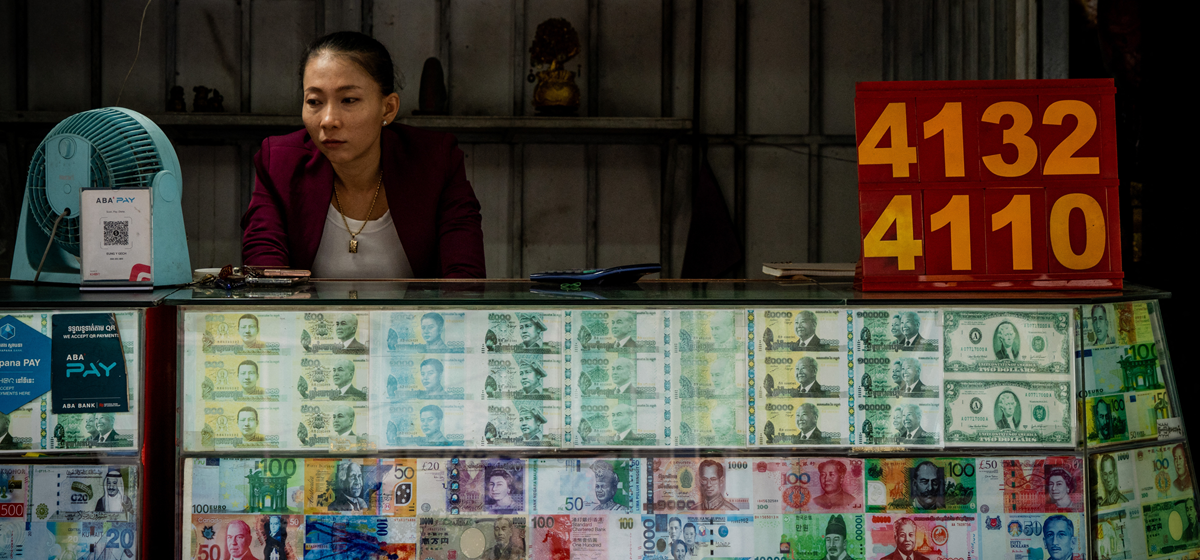- A major ban could shift the tide for the future of cryptocurrency — here’s how
- Ernst König Finanzakademie Launches AI Ernst König
- Traders book $500M losses as BTC, XRP, and PEPE, tumble on hawkish Fed fears
- 2024 Cryptocurrency Investment and Financing Changes: Decoupling of Primary and Secondary Markets, VC Projects Losing Dominance
- Doc ‘God Bless Bitcoin’ Makes Moral Case for World’s Most Transformative Cryptocurrency
Cambodia’s ban on overseas cryptocurrency exchange websites is well-intentioned, but it ignores more systemic issues.
Bạn đang xem: The Flawed Approach of Cambodia’s Cryptocurrency Ban
In November 2024, the Telecommunications Regulator of Cambodia (TRC) blocked access to 16 major cryptocurrency exchange websites, including Binance and Coinbase, banning over 102 online domains associated with such activities. The ban targeted cryptocurrency sites operating “without the proper licenses and authorisations required by Cambodian law”. While the ban comes with good intentions, its effectiveness would be undermined by easily accessible circumvention methods and deeper issues such as elite corruption.
This ban reflects rising concerns about the risks posed by digital assets like cryptocurrencies, which have become a significant part of Cambodia’s economy. The country was ranked 17th among the top 20 countries in cryptocurrency adoption in 2024. Its domestic cryptocurrency market is valued at US$7.9 million, with an expected user base of 539,000 by 2025.
Three key motivations drove the recent cryptocurrency ban. First, to strengthen state oversight. Only two local platforms — Royal Group Exchange (RGX) and Cambodian Network Exchange (CNX) — are permitted to operate within the “FinTech Regulatory Sandbox” overseen by the National Bank of Cambodia. However, overseas exchanges like Binance are more popular due to lower trading fees and a large user base for peer-to-peer (P2P) trades (Binance alone has approximately 200,000 registered users in Cambodia). The ban aims to direct users towards local platforms that are easier for authorities to regulate.
Xem thêm : KULR Technology Makes Bold $21M Bitcoin Investment, Acquires 217 BTC at $96.5K Average
The second motivation is to promote demand for local currency. Cambodia’s economy operates on a dual-currency system, with over 80 per cent of transactions conducted in US dollars alongside the Cambodian riel. The government wants to reduce dependency on foreign currencies by restricting access to digital assets that trade primarily in US dollars. This measure aligns with initiatives like the Bakong digital payment system, designed to strengthen demand for local currency by facilitating cashless transactions for locals and tourists in Cambodian riel.
Cambodia’s ban on overseas cryptocurrency exchanges reflects a justified yet flawed effort to bolster state oversight, promote the riel, and combat cybercrime amid the economic and regulatory challenges brought by cryptocurrency trading.
The third reason is Cambodia’s intention to shed its reputation as a haven for cybercriminals. In 2024, Cambodia ranked 20th worldwide in criminal activity and 146th in its ability to resist crime. Cybercriminal operations, often linked to human trafficking operations in Phnom Penh and Sihanoukville, generate between US$7.5 billion and US$12.5 billion annually — nearly half of the country’s formal GDP. It has grown into a robust industry integrated into the local economy. This has attracted international backlash, such as US sanctions freezing assets linked to allies of Cambodia’s ruling elite. Many of these syndicates utilise cryptocurrencies to transfer and store illicit funds, prompting the ban to disrupt their activities.
However, the ban may have significant limitations in achieving its goals. The ban only denies access to cryptocurrency exchange websites and leaves mobile applications functional. Additionally, users can bypass the restrictions using virtual private networks (VPNs), which are legal in Cambodia. This makes it possible for determined users to continue accessing overseas exchanges.
The ban’s ability to curb cybercrime is also questionable. Platforms like Huione Guarantee, widely used by Southeast Asian cybercriminals for cryptocurrency-to-fiat exchanges through middlemen, continue to operate in Cambodia. Critics argue that the Cambodian government tolerates such activities due to alleged links to high-ranking officials, noting that the state has suppressed journalists investigating cybercrime. Consequently, the ban disproportionately affects small-scale speculators and overseas Cambodians relying on cryptocurrencies for remittances.
Xem thêm : Cryptocurrency Is Surging Again. Here’s How to Spot Scams and Keep Your Wallet Safe
Given the shortcomings of the current ban, Cambodia should adopt a more refined approach to achieve its objectives. To effectively increase state oversight, the government can broaden its licensing framework to include overseas platforms that comply with state regulations. For example, Singapore’s Payment Services Act (PSA) allows overseas exchanges such as Coinbase to operate legally after obtaining a Major Payment Institution (MPI) licence. Licensed platforms must adhere to strict Anti-Money Laundering (AML) and Countering the Financing of Terrorism (CFT) measures, as well as demonstrate robust cybersecurity and consumer protection protocols. A similar approach in Cambodia would potentially bring state oversight to mainstream overseas cryptocurrency exchanges. This would ensure compliance with national laws.
To ensure the stability of the riel, Cambodia can promote local platforms as viable alternatives to overseas exchanges. Thailand’s Gulf Binance — a partnership between Thai energy supplier Gulf Energy and Binance — allows crypto-to-fiat transactions in Thai baht. Cambodia could replicate this model with local exchanges such as RGX by permitting crypto-to-fiat trades in riel (local exchanges are currently prohibited from conducting crypto-to-fiat transactions). Incentivising users to utilise these platforms for remittances and speculation — the primary uses of cryptocurrency by Cambodians — can be achieved through localised customer support and competitive transaction fees. Moreover, integrating the Bakong system with local cryptocurrency exchanges as a payment method could promote riel usage in cryptocurrency transactions, reducing dependence on the US dollar.
Lastly, to effectively disrupt cybercrime, the government should address the systemic corruption within Cambodia that has allowed cybercrime syndicates to thrive. Cambodia ranked 158th out of 180 countries globally in 2023, highlighting pervasive corruption within state institutions. This is largely due to low salaries and ineffective anti-corruption laws, which incentivise corruption at all levels of government, ranging from a compromised law enforcement and judiciary to political elites owning scam compounds. Thus, robust anti-corruption reforms are essential to dismantle the unofficial protections that enable cybercriminals. This can be done by strengthening anti-corruption agencies and providing robust whistleblower protections to foster accountability. These measures create an environment where the activities of cybercrime syndicates can be effectively curtailed. However, given the profitable and strong ties between the ruling elite and these criminal organisations, such reforms are unlikely to occur.
Cambodia’s ban on overseas cryptocurrency exchanges reflects a justified yet flawed effort to bolster state oversight, promote the riel, and combat cybercrime amid the economic and regulatory challenges brought by cryptocurrency trading. However, its effectiveness is undermined by accessible circumvention methods and the state’s neglect of underlying issues like government corruption allowing elite-linked cybercrime to flourish. Instead, Cambodia requires a comprehensive strategy. This would involve incorporating compliant overseas cryptocurrency exchanges into state regulations, encouraging the use of the local currency in trades, and enforcing robust anti-crime measures and institutional reforms.
2025/9
Nguồn: https://gapinsurance.click
Danh mục: News




